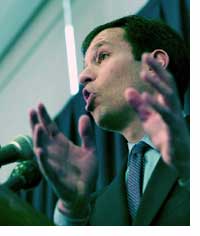Ken Mehlman ’91 heads re-election effort for George W. Bush
Ken Mehlman ’91 was a Republican before law school. But HLS helped make him the Republican he is today. His predominantly liberal fellow students in fact made him “more Republican, more conservative,” spurred by his view that rampant elitism drove their ideology, he said.
“There were a lot of people there who seemed to think that, because of the fact that they were fortunate to have this excellent education, they were therefore entitled to make decisions for other people who didn’t have that education,” he said. “And my experience is that I respect people no matter what their education is. Usually people are able to make decisions for their own lives and don’t need a bunch of kids who went to a good law school to tell them what to do.”
Mehlman’s boss would likely concur. That’s just one reason Mehlman is working to ensure that he keeps him in office for another four years.
Once a member of the HLS Republicans, Mehlman now serves as campaign manager for the Bush-Cheney re-election effort. He directs the operation from an office building in Arlington, Va., in which he monitors the president’s field organization and, as he did during an interview in the fall, the Democrats who want to upend him.
Yet, even as he occasionally glances at a TV in his office showing Democratic candidates appearing at an event in Washington, D.C., his focus remains on the president and the themes of leadership, security and “compassionate conservatism” that he believes will sway the election in George W. Bush’s favor.
“The strong message we can bring forward is that this is a president who has the strong leadership to take on incredibly tough challenges and do it in a way that not only solves those challenges but deals in a very big way with big problems,” said Mehlman.
He acknowledges that the presidential election will likely be close, much like the last one, which Mehlman saw firsthand as the national field director for Bush-Cheney 2000 and one of the first officials from Bush campaign headquarters to travel to Florida after the state’s contested vote. His role in Bush’s victory, in which he supervised regional political directors across the country, was the culmination of a career in politics that began with his party’s rise to power in Congress.
After three years practicing environmental law at Akin Gump Strauss Hauer & Feld in Washington, D.C., Mehlman joined Texas Congressman Lamar Smith’s staff as legislative director in October 1994. He recalls an attorney at the firm saying to him then, “House Republicans are less important than a bucket of warm spit. Why are you going to work for them?”
A month later, he had an answer, when Republicans gained the majority in Congress and influence they had long lacked. His next position, as chief of staff for Rep. Kay Granger, also from Texas, led to his meeting Karl Rove, her campaign consultant and later Bush’s senior adviser in the White House.
Following the 2000 election, Mehlman became White House political director and one of Rove’s deputies, working closely with him on the administration’s political strategy. Rove, a frequent target of Democratic criticism, “ultimately cares about the substance and ideas as much as anybody and masters them as much as anybody,” said Mehlman.
Personal attacks against Rove and the president himself–or indeed against anyone in politics–cheapen discourse and alienate voters, Mehlman says. “Too often it becomes personal; it becomes divisive,” he said. “This is the biggest gripe I have, and this partly explains my ideological politics. I don’t think you need to question people’s motives.”
His own motives are simple, he says. The term “compassionate conservative,” coined by the president, inspires him. He believes that conservative approaches–less government, more individual responsibility, more of a market orientation–produce compassionate ends. And he has believed in the president since the first time he met him, when Bush was running for governor of Texas and echoed his own views. Of course he wants people to vote for Bush–but he’s not going to tell them what to do.
